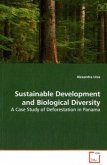Anthropologists have long recognized the central role
of social systems in enhancing environmental
sustainability, but few have attempted to accurately
assess the conditions under which traditional social
institutions can equitably and effectively manage
access to natural resources for the purposes of their
use and conservation.
This book examines the connections between
institutional and economic incentives and resource
use and management decisions among the Naso
indigenous people in Bocas del Toro, Panama. It
incorporates insights from development anthropology,
common property systems and political ecology to
develop a multi-sited approach that uses multiple
research methods.
This analysis of the Naso case will be especially
useful to development planners, regulators and other
stakeholders interested in the design and
implementation of more equitable solutions to
problems with the distribution of the social and
environmental costs and benefits associated with
large infrastructure projects.
of social systems in enhancing environmental
sustainability, but few have attempted to accurately
assess the conditions under which traditional social
institutions can equitably and effectively manage
access to natural resources for the purposes of their
use and conservation.
This book examines the connections between
institutional and economic incentives and resource
use and management decisions among the Naso
indigenous people in Bocas del Toro, Panama. It
incorporates insights from development anthropology,
common property systems and political ecology to
develop a multi-sited approach that uses multiple
research methods.
This analysis of the Naso case will be especially
useful to development planners, regulators and other
stakeholders interested in the design and
implementation of more equitable solutions to
problems with the distribution of the social and
environmental costs and benefits associated with
large infrastructure projects.








